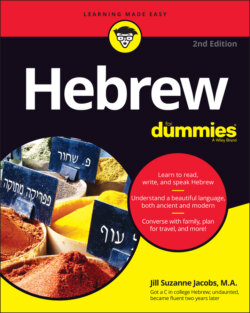Читать книгу Hebrew For Dummies - Jill Suzanne Jacobs - Страница 22
Counting higher
ОглавлениеTo form the numbers 11–19, place the second number in front of the 10. In the masculine form, for example, 11 is אַחַד עָשָׂר. In the feminine form, 11 is אַחַת עֶשְׂרֵה (ah-chaht es-reh). Table 1-2 shows the numbers 11–19.
Use the appropriate gender for the 10 and the additional number that makes up the compound number.
The multiples of ten (10, 20, 30, and so on) are easy because these numbers are gender-neutral. Table 1-3 shows the multiples of 10.
TABLE 1-2 Counting from 11 to 19
| Number | Masculine | Feminine |
|---|---|---|
| 11 | אַחַד עָשָׂר (eh-ḥad ah-sahr) | אַחַת עֶשְׂרֵה (ah-ḥaht ehs-reh) |
| 12 | שְׁנֵים עָשָׂר (shnehym ah-sahr) | שְׁתַּיִם עֶשְׂרֵה (shtehym ehs-reh) |
| 13 | שָׁלוֹשׁ עָשָׂר (shloh-sha ah-sahr) | שְׁלוֹשָׁה עֶשְׂרֵה (shlosh-ehsreh) |
| 14 | ַ אַרְבָּעָה עָשָׂר (ahr-bah-ah ah-sahr) | אַרְבַּע עֶשְׂרֵה (ahr-bah es-reh) |
| 15 | חֲמִשָּׁה עֶשֶׂר (ḥah-mee-shah ah-sahr) | חָמֵשׁ עֶשְׂרֵה (ḥah-mesh es-reh) |
| 16 | שִׁשָּׁה עֶשֶׂר (shee-shah ah-sahr) | שֶׁיֵּשׁ עֲשָׂרָה (shehsh ehs-reh) |
| 17 | שִׁבְעָה עָשָׂר (sheev-ah ah-sahr) | שְׁבַע עֲשָׂרָה (shvah es-reh) |
| 18 | שְׁמוֹנָה עֶשֶׂר (shmoh-nah ah-sahr) | שְׁמוֹנֶה עֶשְׂרֵה (shmoh-neh ehs-reh) |
| 19 | ש תִּשְׁעָה עָשָׂר (teesh-ah ah-sahr) | תְּשַּׁע עֶשְׂרֵה (tshah-esreh) |
TABLE 1-3 Counting Multiples of 10
| Number | Hebrew | Pronunciation |
|---|---|---|
| 20 | עֶשְׂרִים | ehs-reem |
| 30 | שְׁלוֹשִׁים | shloh-sheem |
| 40 | אַרְבָּעִים | ahr-bah-eem |
| 50 | חֲמִשִּׁים | ḥah-mee-sheem |
| 60 | שִׁשִּׁים | shee-sheem |
| 70 | שִׁבְעִים | sheev-eem |
| 80 | שְׁמוֹנִים | shmoh-neem |
| 90 | תִּשְׁעִים | teesh-eem |
If you want to say something like “21” or “47,” however, you have to pay attention to gender again. (See Table 1-4.) The pattern for making these numbers is to state the number in the tens, such as עֶשְׂרִים (ehs-reem; 20) and then add the word for and (וְ’; veh), followed by the single number, such as אֶחָד (eh-chad; one). So, 21 would be עֶשְׂרִים וְאֶחָד (ehs-reem veh-eh-chad).
TABLE 1-4 Counting from 21 to 29
| Number | Masculine | Feminine |
|---|---|---|
| 21 | עֶשְׂרִים וְאֶחָד (ehs-reem veh-eh-ḥahd) | עֶשְׂרִים וְאַחַת (ehs-reem veh-ah-ḥat) |
| 22 | עֶשְׂרִים וּשְׁנַיִם (ehs-reem oosh-nah-yim) | עֶשְׂרִים וּשְׁתַּיִם (ehs-reem ush-tah-yeem) |
| 23 | עֶשְׂרִים וּשְׁלוֹשָׁה (ehs-reem oosh-loh-sah) | עֶשְׂרִים וְשָׁלוֹשׁ (ehs-reem veh-shah-lohsh) |
| 24 | עֶשְׂרִים וְאַרְבָּעָה (ehs-reem veh-ahr-bah-ah) | עֶשְׂרִים וְאַרְבַּע (ehs-reem veh-ahr-bah) |
| 25 | עֶשְׂרִים וַחֲמִשָּׁה (ehs-reem vah-ḥah-mee-shah) | עֶשְׂרִים וְחָמֵשׁ (ehs-reem veh-ḥah-mesh) |
| 26 | עֶשְׂרִים וְשִׂבַּע (ehs-reem veh-sheev- ah) | עֶשְׂרִים וְשֵׁשׁ (ehs-reem veh-shehsh) |
| 27 | עֶשְׂרִים וְשִׁבְעָה (ehs-reem veh-sheev- ah) | עֶשְׂרִים וְשֶׁבַע (ehs-reem veh-sheh-vah) |
| 28 | עֶשְׂרִים וּשְׁמוֹנָה (ehs-reem ush-moh-nah) | עֶשְׂרִים וּשְׁמוֹנֶה (ehs-reem ush-moh-neh) |
| 29 | עֶשְׂרִים וְתִשְׁעָה (ehs-reem veh-teesh-ah) | עֶשְׂרִים וְתֵשַׁע (ehs-reem veh-the-sha) |
If you can count to 30, you can count to a million! For all the numbers, you follow the same pattern as in Table 1-4. First, state the number that’s the multiple of 10 (20, 30, 40, and so on); then add וְ (veh; and) plus the single digit: שְׁלוֹשִׁים וְאֶחָד (shloh-sheem veh-eh-ḥahd; 31), אַרְבָּעִים וְאֶחָד (ahr-bah-eem veh-eh-chahd; 41), and so on.
To count by hundreds, first say the feminine number of the quantity of hundreds, such as four (אַרְבַּע), and then add the word for hundreds (מֵאוֹת). This pattern continues until a thousand:
| 100 | מֵאָה | may-ah |
| 200 | מָאתַיִם | mah-tah-yeem |
| 300 | שְׁלוֹשׁ מֵאוֹת | shlohsh-meh-oht |
To count by thousands, first you say the feminine number of the quantity of thousands and then follow it with the word for thousands, אֲלָפִי (ah-lah-feem). This pattern continues to 1 million. The Hebrew word for 1,000 is אֶלֶף (eh-lehf), and the word for 2,000 is אַלְפַּיִם (ahl-pah-yeem):
| 1,000 | אֶלֶף | eh-lehf |
| 2,000 | אַלְפַּיִם | ahl-pah-eem |
| 3,000 | שְׁלֹשֶׁת אֲלָפִים | shloh-sheht ah-lah-feem |
| 10,000 | עֲשֶׂרֶת אֲלָפִים | ah-seh-reht ah-lah-feem |
| 1,000,000 | מִלְיוֹן | meel-yohn |
Several chapters in this book give you an opportunity to practice using numbers. Check out Chapter 9 to find out how to ask for and give phone numbers. Also see Chapter 14, which is all about money. Don’t you love counting money?
